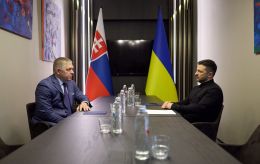FATF to consider Ukraine's request to blacklist Russia
 FATF may blacklist Russia (Getty Images)
FATF may blacklist Russia (Getty Images)
The Financial Action Task Force (FATF) is set to decide next week on whether to include Russia in its blacklist. According to a confidential document, Ukraine is once again pushing for this move, citing Politico.
The Paris-based body regularly evaluates countries based on their commitment to combating money laundering, terrorist financing, and the financing of the proliferation of nuclear, chemical, or biological weapons.
Being placed on the FATF's blacklist or greylist can seriously damage a country's financial reputation and is seen as economically detrimental for most nations.
FATF suspended Russia's membership in February 2023 — one year after Moscow invaded Ukraine — but has so far refrained from adding it to the blacklist. Now, Ukraine has intensified its campaign to change that.
FATF has publicly stated that it considers Russia's aggression unacceptable and contrary to its "core principles," but in practice, downgrading Russia’s status requires consensus among its multilateral members.
Currently, the intergovernmental body comprises about 40 countries, including China, India, Brazil, South Africa, and Saudi Arabia. It meets three times a year to assess which countries should be added to or removed from the grey or blacklists.
According to the document, Ukraine first requested the inclusion of Russia in the high-risk jurisdictions in April 2022 and has since continually — albeit unsuccessfully — provided new evidence to lower Moscow's status.
To succeed in the latest round of meetings, Ukraine will need to convince FATF's internal body, tasked with reviewing candidates and evidence, which is set to convene on October 22, to recommend the proposal for formal consideration.
If Ukraine’s latest initiative succeeds, Russia would join Iran, North Korea, and Myanmar in FATF’s list of countries with the highest risk.
The dossier presented to members emphasizes the close financial and military cooperation between Russia and high-risk countries such as North Korea and Iran. It also highlights Russia’s financing of private formations like the Wagner Group and their associated illegal activities.
There are also mentions of the role of Telegram channels and cryptocurrencies in facilitating Russia’s financing of terrorism and laundering "money obtained from goods stolen during its invasion of Ukraine" — from grain to minerals.
FATF has consistently refused to place Russia on the blacklist or even the "greylist," despite Ukraine providing evidence of Moscow’s involvement in terrorist financing and collaboration with regimes in Iran and North Korea.

